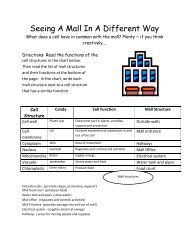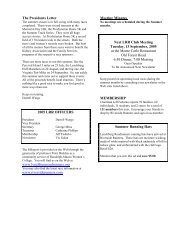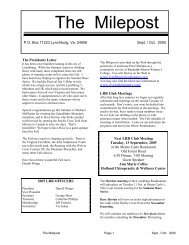Destinos: 27-52 The Main Grammar Points, and Exercises with ...
Destinos: 27-52 The Main Grammar Points, and Exercises with ...
Destinos: 27-52 The Main Grammar Points, and Exercises with ...
You also want an ePaper? Increase the reach of your titles
YUMPU automatically turns print PDFs into web optimized ePapers that Google loves.
28<br />
*** <strong>The</strong> present subjunctive is never used after si=if.<br />
Examples:<br />
If I have money (<strong>and</strong> I may or may not) tonight, I’ll go.<br />
Si tengo (present INDICATIVE) dinero esta noche, iré.<br />
(subjunctive would be wrong)<br />
We’ll buy that car if we can save enough money.<br />
Compraremos aquel carro si podemos (present INDICATIVE) ahorrar suficiente dinero.<br />
(subjunctive would be wrong)<br />
If I had money (clearly I don’t, or I wouldn’t say this), I would go.<br />
Si tuviera (past SUBJUNCTIVE) dinero, iría.<br />
If I had had money last night (clearly, I didn’t), I would have gone.<br />
Si yo hubiera tenido (past perfect SUBJUNCTIVE) dinero anoche, habría ido.<br />
In sentences 3 <strong>and</strong> 4, the information in the si clauses is clearly contrary to fact (I don’t have the<br />
money in 3; I didn’t have the money in 4), so subjunctive is called for. <strong>The</strong> tense is past, or past<br />
perfect. In sentences 1 <strong>and</strong> 2, the information in the si clauses is not clearly contrary to fact (in<br />
both cases it remains to be seen--whether I have money in 1, <strong>and</strong> whether we can save enough<br />
money in 2), <strong>and</strong> so indicative is used. <strong>The</strong> tense of the verb is the present, because of the sense<br />
of the statement. It would be incorrect to use the present subjunctive in these sentences.<br />
Another way to summarize the rules for which mood to use in si clauses is to say that the<br />
present subjunctive is never used after si when it means if. If you need a present tense after<br />
si, use the indicative; if you need the subjunctive mood after si, don’t use present tense.<br />
Oftentimes, the tense of the verb in the independent clause will help you decide which tense <strong>and</strong><br />
mood to use after si=if (either present indicative or past/past perfect subjunctive). When the<br />
independent clause verb is in the conditional tense, the verb in the dependent si clause will be in<br />
the past subjunctive. When the independent clause verb is in the future tense, the verb in the<br />
dependent si clause will be in the present indicative:<br />
Example:<br />
“Si se casaran, Raquel sería nuestra tía,” Ángela says to her brother Roberto at one point in the<br />
<strong>Destinos</strong> episodes: “If they were to marry, Raquel would be our aunt.” Even though the<br />
information in the si clause is not clearly contrary to fact (Raquel <strong>and</strong> Arturo might well marry),<br />
because the independent clause verb is in the conditional (sería=she would be), the verb in the<br />
dependent si clause is in the past subjunctive (se casaran=they were to marry).<br />
Ángela might have said to Roberto “If they do get married, Raquel will be our aunt,” <strong>and</strong> now the<br />
Spanish equivalent would be “Si se casan, Raquel será nuestra tía.” In this second sentence, the<br />
independent clause verb is in the future--Raquel will be our aunt--so the verb after si is in the<br />
present indicative, se casan. So in the first sentence we find past subjunctive after si, <strong>and</strong> in the<br />
second sentence we see present indicative following si, even though the information in both si<br />
clauses is the same (that is, not clearly contrary to fact).


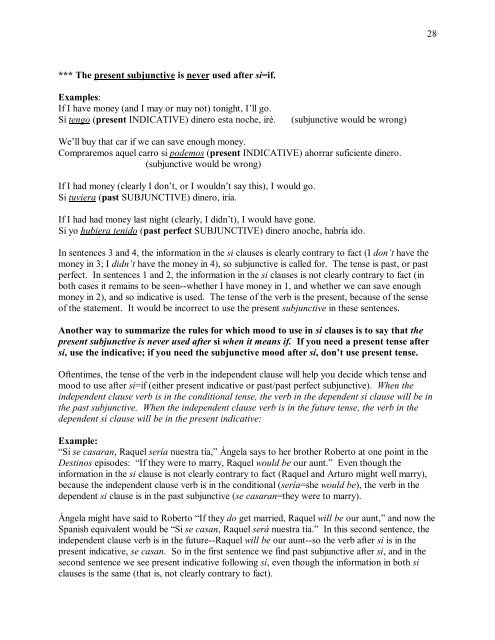
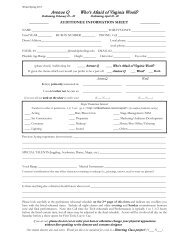
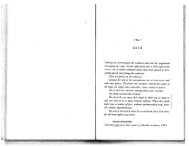
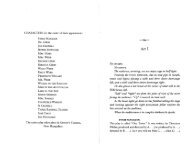
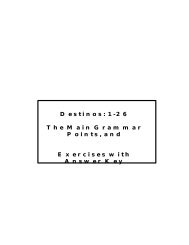
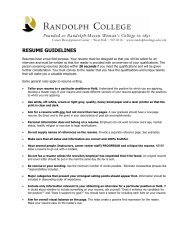
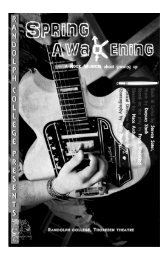
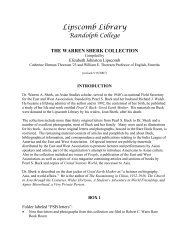
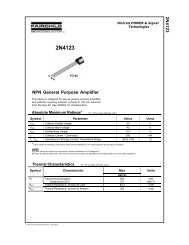

![Cast & Crew List [Program Copy pdf] - Randolph College](https://img.yumpu.com/38268916/1/190x123/cast-crew-list-program-copy-pdf-randolph-college.jpg?quality=85)
